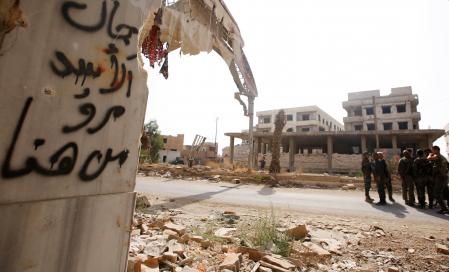
By Michelle Nichols
UNITED NATIONS (Reuters) – The spotlight will be on Syria when world leaders gather at the United Nations next week as the United States and Russia try to shore up a fragile truce deal and President Barack Obama pushes for a boost in global refugee aid.
Some 135 heads of state and government and dozens of ministers will attend the 71st General Assembly, the last for both Obama and U.N. Secretary-General Ban Ki-moon, who will step down at the end of 2016 after a decade in the job.
“While many conflicts are causing enormous pain, none is causing so much death, destruction and widespread instability as the worsening war in Syria,” Ban told reporters on Wednesday. “Major countries with influence have a duty to use their influence and seize this latest opportunity to pursue a political solution.”
Members of the International Syria Support Group (ISSG), which includes Russia and the United States, are likely to meet on the sidelines at the United Nations on Tuesday, diplomats said, while the U.N. Security Council is due to hold a high-level meeting on Syria on Wednesday.
Russia had wanted the council to endorse its Syria truce deal with the United States during the meeting, but on Friday said a resolution was unlikely because Washington did not want to share the documents detailing the agreement with the 15-member body.
White House Deputy National Security Adviser Ben Rhodes said on Friday he anticipated many of the U.S. discussions at the United Nations “will focus on the situation in Syria, the response to North Korea’s latest nuclear test, our shared efforts to combat (Islamic State) with many U.N. member states.”
Nearly 5 million Syrians have fled the country, and some 6.5 million have been internally displaced during the more than five-year conflict, contributing to the record 65.3 million people who were uprooted worldwide last year.
REFUGEE CRISIS
Before the world leaders begin their traditional speeches on Tuesday, the 193-member General Assembly will meet on Monday to adopt a political declaration on migrants and refugees. It is not legal binding, does not include a call by Ban for 10 percent of refugees to be resettled annually and has been dismissed by human rights groups as insufficient.
The next day, Obama will host a summit that aims to boost humanitarian funds by a third and double the number of refugees being resettled annually. Countries are allowed to participate only if they are making pledges.
“We are not going to solve the refugee crisis on Tuesday, but I think you will see an important show of political will from leaders around the world,” U.S. Ambassador to the United Nations Samantha Power told reporters on Thursday.
On the sidelines of the week-long U.N. gathering, meetings are planned on other crises such as South Sudan, Yemen, Iraq and Libya. World powers also will meet to discuss the implementation of a deal to curb Iran’s nuclear capabilities and the stalled Israeli-Palestinian peace process.
Ban is hoping to bring the Paris climate change deal closer to reality with an event for states to deposit their instruments of ratification or approval.
The United Nations said some 20 countries have indicated they will do so. The deal needs ratification by at least 55 countries representing 55 percent of global carbon dioxide emissions to take effect. So far, 27 nations that produce 39 percent of emissions have ratified it, including the United States and China, the biggest emitters.
Diplomats said there is also likely to be gossip in the halls about the race to replace Ban as secretary-general ahead of the fourth secret ballot by the Security Council on Sept. 26.
Former Portuguese Prime Minister Antonio Guterres finished on top in the first three polls. When the 15-member council reaches a consensus, it will recommend a candidate to the General Assembly for election.
U.N. spokesman Stephane Dujarric said there would more than 1,100 bilateral meetings between leaders at the United Nations during the next week.
He summed up the annual gathering: “It’s the World Cup of diplomacy. It’s the Oscars of diplomacy. It’s also an interesting fashion week.”
(Reporting by Michelle Nichols; Editing by John Walcott and Cynthia Osterman)